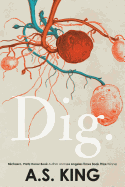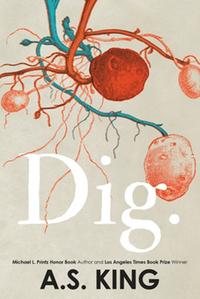
 For 200 years, Gottfried Hemmings's family owned a Pennsylvania potato farm. By the time Gottfried's fifth child was born, the farm had been divided up among him and his siblings. Gottfried sold his portion to developers. He and his wife, Marla, now have "more than ten million dollars in the bank"--which they refuse to share with their grown children or grandchildren because they want them to be "independent."
For 200 years, Gottfried Hemmings's family owned a Pennsylvania potato farm. By the time Gottfried's fifth child was born, the farm had been divided up among him and his siblings. Gottfried sold his portion to developers. He and his wife, Marla, now have "more than ten million dollars in the bank"--which they refuse to share with their grown children or grandchildren because they want them to be "independent."
The Shoveler is 16 years old and has moved 17 times. His mother has "trouble with money," so she buys cheap food (potatoes) and steals the expensive stuff, and digs through people's garbage for credit card and Social Security info. They've moved to Pennsylvania because his mom has "business" here, but she won't tell him what. "The only constant in my life other than my mother," The Shoveler thinks, "is our potato pot."
CanIHelpYou?'s family is affluent. But CanIHelpYou?'s best friend is one of the few black boys in her neighborhood and her parents make it very clear they're not okay with that. So CanIHelpYou? works at Arby's and sells drugs ("potato cakes" at the drive-thru) to provide for herself, refusing to take money from those "nightmare racists."
Loretta lives in a camper with her mother, her father--whom her mother occasionally kicks out but always lets back in--and a lunch box full of fleas. Loretta spends her time alone, training her Flea Circus, acting for an audience only she sees. Malcolm's father is dying from cancer. In between chemo treatments, father and son take trips to Negril. When in Pennsylvania, though, Malcolm stays with grandparents Marla and Gottfried. He hates it: he's uncomfortable with their bigotry and their wealth. The Freak's father "said tampons and pads were too expensive when she got her period, so she's used everything from a menstrual cup to random washcloths." The Freak spends her time "flickering," traveling instantly between places, helping Malcolm dig up secrets and giving Loretta a new dress when her dad starts commenting on her legs.
As with many of A.S. King's (Still Life with Tornado) young adult novels, it takes time to get a handle on Dig. The perspective moves among the five teens; the connections grow clearer as the story unfolds. Dig's surrealism highlights the realism in the teens' tragic experiences. Though not easy, Dig is hopeful--these teens recognize how the racism and privilege of previous generations have shaped their lives and they work to be better. Brutally candid, Dig is well worth the intellectual and emotional investment. --Siân Gaetano, children's and YA editor, Shelf Awareness
Shelf Talker: A.S. King's newest work for young adults is a surreal, painfully open depiction of how the privilege and unconscious bias of one generation affect the lives of the next.

